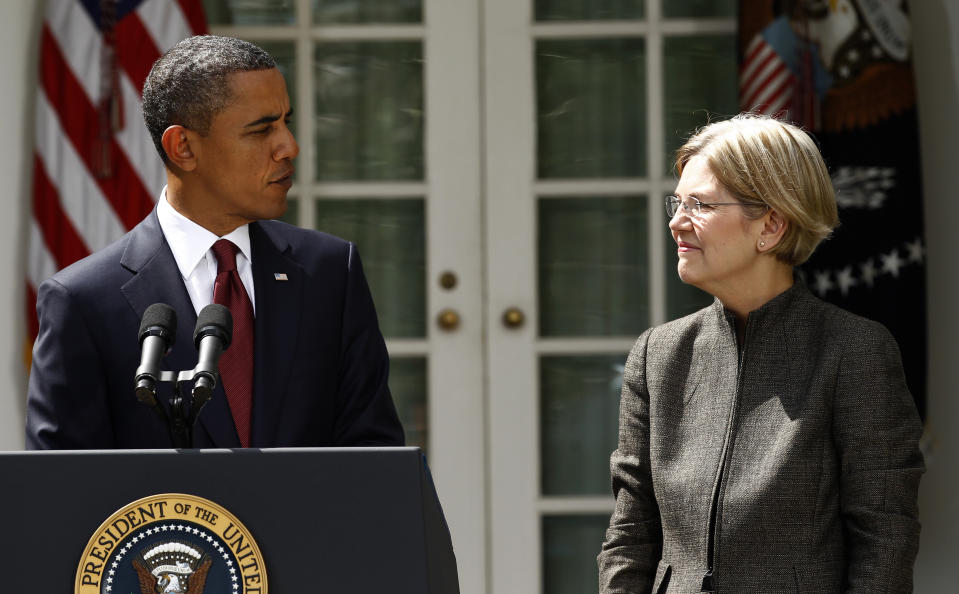Elizabeth Warren's message for final sprint before Iowa: 'I believe in markets'
With less than two months until Iowa kicks off the primary season, presidential candidate Elizabeth Warren traveled to New Hampshire this week to deliver what her campaign billed as a big speech on building “an economy that works for everyone.”
She directed new attacks at her rivals, including Joe Biden and Pete Buttigieg. Perhaps less noticed was a subtle contrast she continues to draw with her third main rival: Bernie Sanders.
“I believe in markets,” Warren said without naming the Vermont senator who identifies as a Democratic Socialist. “I’m proud of what American businesses can create and I want them to thrive.”
She was a bit more direct when she pushed back against those who choose to label her a socialist. Noting that her plans will “save people money and spur economic growth and innovation, but every time I talk about them, there’s somebody who wants to call me a socialist or a radical.” She went on to note that Franklin Roosevelt and Barack Obama — two popular Democrats — faced similar attacks.

The speech came as Warren heads into a primary season locked in a four-way Democratic primary battle. A recent New Hampshire poll found just six points separate Warren, Biden, Buttigieg, and Sanders. And Michael Bloomberg is lurking as he spends millions on the later-voting states. The Iowa caucus is Feb. 3.
A focus on her background
One area where the Massachusetts senator spent a lot of time in her speech (and hit some moderate-friendly notes) was when she delved into her background.
She discussed her career in academia, noting, "I wanted to make sure I understood money and how it affected families."
"I spent decades studying why families go broke," she said.
Before she got into politics, Warren did indeed focus on financial issues from a personal perspective. Her 2004 book, “The Two-Income Trap: Why Middle-Class Mothers and Fathers Are Going Broke,” was written with Amelia Warren Tyagi, her daughter. The book focused on personal bankruptcy and economic insecurity. She also wrote “All Your Worth: The Ultimate Lifetime Money Plan” (also with her daughter), before she came to Washington.
In her New Hampshire speech, Warren returned repeatedly to her role in creating the Consumer Financial Protection Bureau. The government agency was created to "enforce some basic rules against cheating,” she said, adding that the bureau shows how "we can make government work."

Touting what the CFPB has done, Warren said, “the agency has returned more than $12 billion to people who were cheated... The credit market has worked better both for customers and honest businesses.”
Change that can actually happen
Warren has seen her rise in the polls stall at the same moment she’s come under criticism for claiming her Medicare for all plan wouldn’t require an increase in taxes on the middle class.
In her speech, health care came up (and she repeated the claim) but it was not the focus of the address. Instead, more time was spent on pocketbook issues. At one point, she discussed her work helping Americans get low-cost hearing aids. When health care did come up, she stood behind Medicare for all, and also discussed the need to “reduce prices for critical drugs like EpiPens and insulin.”
Her pitch boils down to the idea that Democrats can run and can win on her progressive economic agenda that still works within the current system. "We'll make real change starting in 2021," she said, based in part on the evidence that, "I actually got [the CFPB] passed into law."
She also added a variety of nods in the direction of the business community. She said her plans are designed to "boost the economy," along with helping middle-class workers. Bernie Sanders recently joked in an interview that he doesn’t have (or seem to want) any friends on Wall Street.
There was even a pro-business (at least pro-small business) argument behind her plan to break up big tech companies. Doing so “will clear the way for another generation of innovative tech firms and stop companies like Amazon from stealing ideas from small outfits and driving them out of business,” she said.

Warren has made some of these of business-friendly gestures before: “I am a capitalist to my bones,” she once said, to which Sanders later responded, “I’m not.”
Despite some outreach to the middle, still no moderate
Warren did, in the end, save her sharpest barbs for the moderates in the race.
She called out former video president Joe Biden, saying “one Democratic candidate walked into a room of wealthy donors this year to promise that ‘nothing would fundamentally change’ if he’s president.” Likely referring to South Bend, Ind., Mayor Pete Buttigieg, she said, “when a candidate brags about how beholden he feels to a group of wealthy investors, our democracy is in serious trouble.”
Lis Smith, a senior Buttigieg advisor, immediately fired back with a statement: “Senator Warren's idea of how to defeat Donald Trump is to tell people who don’t support her that they are unwelcome in the fight and that those who disagree with her belong in the other party."
Warren’s larger economic argument hinges on the idea that she will fight for the progressive goals (like breaking up big tech companies and instituting a wealth tax) that her more moderate rivals would avoid and she would actually achieve it.
"We need big, structural change," she said in one of the largest applause lines of the speech.
Ben Werschkul is a producer for Yahoo Finance in Washington, DC.
Read more:
Pete Buttigieg has a big new plan to shake up the retirement system
Here’s what bugs Democratic presidential candidate Michael Bennet about the front-runners
Read the latest financial and business news from Yahoo Finance
Follow Yahoo Finance on Twitter, Facebook, Instagram, Flipboard, LinkedIn, YouTube, and reddit.
